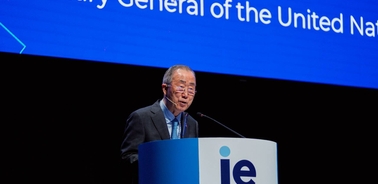- Home
- Blue Talks
- Is There Still A Role For Compassion In Global Leadership?
Is there still a role for compassion in global leadership?

The geopolitical climate is uncertain and the rules of engagement are changing – but some things remain constant.
During the Blue Talks conversation with IE University Provost Manuel Muñiz, former UN Secretary-General Ban Ki-moon outlined his philosophy for leadership, stating it should “flow like water” – exhibiting a balance between humanity and humility, not discriminating and always flowing from top to bottom.
Citing John F. Kennedy as an inspiration, Ban Ki-moon went on to paraphrase the former President in his own message to current world leaders, urging them to work together to tackle global issues: “We are living in a small world. John F Kennedy said that there are no national boundaries at a time like this, the only thing that matters is whether you are ready to extend a helping hand.” He continued: “We are global citizens, so we have to go beyond [national] boundaries with passion and compassion.”
In extolling the virtues of a leadership style grounded in humanity, compassion and collaboration, the former Secretary-General may have risked sounding out of step to some, in an era when populism, nationalism and authoritarianism are on the rise around the globe, bringing a more aggressive and confrontational leadership style to the fore.
But in championing a leadership style that incorporates qualities that might be characterized as soft skills, Ban is in fact tapping into a seam of growing recognition of the value such an approach can bring – one that has seen women leaders garner particular praise for their handling of the pandemic, for example.
Empathy in challenging times
“We need to integrate compassion in the way that we work,” says IE University Vice Provost Jaime de Aguinaga, offering his insight into why compassion, empathy and collaboration are so crucial to leadership and problem-solving. “There are technical problems, where you know the problem and the solution, that don’t require compassion, just a technical or operational response. Other times, you know the problem but not the solution, and you need to have the curiosity, drive and wisdom to identify and define the solution. And in most cases, you define that solution working with others.”
“But there is a third level of problem, usually the most critical kind: those situations in which you don’t know what the problem is, nor the solution. In those cases, you really need compassion and empathy to understand the feelings of others; to put yourself in the shoes of others and work from that.”
“Compassion must be aligned with wisdom and the necessary courage to make hard decisions.” IE University Vice Provost Jaime de Aguinaga
It’s a viewpoint formed from years of experience in the field on the frontlines of international development, but also one that gels with research in the area. In an article in the Harvard Business Review, leadership experts Rasmus Hougaard, Jacqueline Carter, and Nick Hobson argue that compassion is a key element of effective leadership – and that compassionate leaders “are perceived as stronger and more competent.”
Crucially, none of the figures in this broad consensus argue that these skills alone make for successful leaders. Hougaard et al. make the case that compassion must be aligned with wisdom and the necessary courage to make hard decisions.
For de Aguinaga, other qualities such as drive, intelligence and ability are also important, alongside external factors such as ensuring institutions are given the right mandate, the right resources and support from stakeholders to tackle the challenges they face, as well as the availability of individuals with high-level skillsets to fill crucial roles.
Even Ban Ki-moon, in his ‘like water’ analogy, added, “Water does not show off its power – but it is the strongest element when necessary.”
Nonetheless, it is a timely reminder of the alternative to the politics of division, polarization and regionalism that are the hallmarks of the social media age – to paraphrase de Aguinaga: building engagement and leading from understanding.